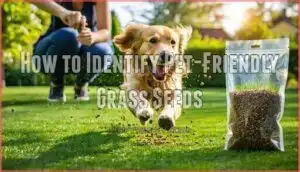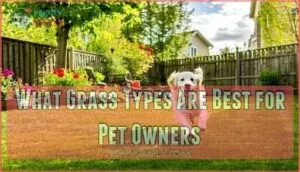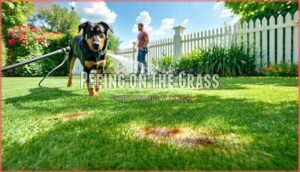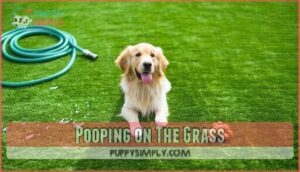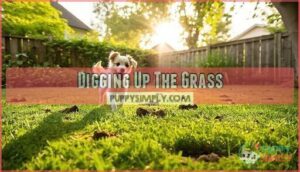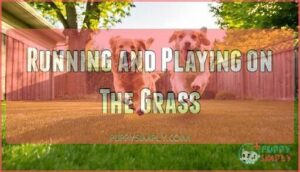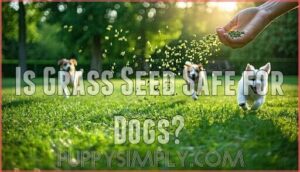This site is supported by our readers. We may earn a commission, at no cost to you, if you purchase through links.
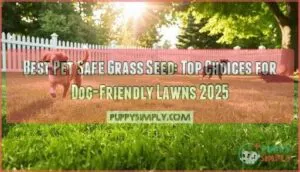
Choose untreated, chemical-free varieties like tall fescue, perennial ryegrass, or Kentucky bluegrass – they’re tough enough to handle paw traffic without needing toxic treatments.
Skip seeds with synthetic coatings or fertilizer blends that could spell trouble for curious dogs.
These hardy grass types bounce back from urine spots and digging adventures while creating a lush, worry-free play zone.
Your pup’s safety comes first, but you don’t have to sacrifice a beautiful yard.
There’s more to creating the perfect pet-friendly lawn strategy.
Table Of Contents
- Key Takeaways
- How to Keep Your Pet Safe From Grass Seeds
- How to Identify Pet-Friendly Grass Seeds
- What Grass Types Are Best for Pet Owners
- Are There Pet-Friendly Fertilizers?
- How Dogs Destroy Lawns
- What Characteristics Make for a Dog-Proof Lawn
- Is Grass Seed Safe for Dogs?
- Jonathan Green Heavy Traffic Seed
- Creeping Red Fescue Seeds
- Frequently Asked Questions (FAQs)
- How often should I inspect and brush my pets for embedded seeds?
- How can I tell if a grass seed has a synthetic coating?
- How do I know which grass varieties are pet-safe?
- What is the best way to water a lawn with a pet?
- How often should I reseed pet areas?
- Can grass seed harm cats or other pets?
- Whats the best seeding season for pet owners?
- How do I prevent pets from eating seeds?
- Should I use pre-emergent herbicides with pet grass?
- Conclusion
Key Takeaways
- You’ll want to choose uncoated, chemical-free grass varieties like tall fescue, perennial ryegrass, or Kentucky bluegrass that can handle heavy paw traffic without needing toxic treatments that could harm your pet.
- You should bury seeds 1/8 to 1/4 inch deep in the soil rather than leaving them on the surface, which prevents curious pets from accessing and potentially ingesting the seeds during germination.
- You need to inspect and brush your pet’s fur, paws, and belly after every outdoor session to remove any stray seeds that could cause irritation or embed in their coat, especially during planting season.
- You can safely use organic fertilizers made from natural sources like feather meal or aged manure that won’t require waiting periods before your pets can access the treated lawn areas, using natural sources.
How to Keep Your Pet Safe From Grass Seeds
Even the safest grass seeds can pose risks to your pets if you don’t take proper precautions during planting and the weeks that follow.
You’ll need to choose chemical-free seeds, work them into the soil rather than leaving them on top.
Keep a close eye on your pets until the grass establishes itself, to ensure their safety with the newly planted seeds.
Avoiding Seeds With Chemicals
When shopping around for grass seed, you’ll want to skip over anything that’s been treated with synthetic chemicals or pesticides.
Skip the chemical-coated seeds—your pet’s paws deserve better than synthetic treatments and bright artificial colors.
These coated seeds might look appealing with their bright colors, but they’re not worth the risk to your pet’s health.
Instead, look for natural seeds that are completely chemical free and marketed as pet safe grass seed options.
Organic grass seed varieties are your best bet since they’re grown without synthetic fertilizers or pesticides.
These non toxic grass seed options eliminate the worry about your dog accidentally ingesting harmful substances while playing in the yard.
Many organic options also come as nontoxic grass seed blends specifically designed for households with pets, giving you peace of mind about pet safety.
Burying Seeds to Prevent Exposure
After choosing chemical-free options, proper seed depth becomes your next line of defense.
Burying pet safe grass seed at the right depth—typically 1/8 to 1/4 inch—keeps curious paws from digging up freshly planted areas.
This burying technique protects both your investment and your furry friend from potential exposure.
Start with thorough soil preparation by loosening the top layer.
Spread your non toxic grass seed evenly, then work it into the soil using a rake or seed spreader.
Proper seed coverage prevents seeds from sitting on the surface where pets might investigate.
This exposure prevention method guarantees your pet friendly lawn seed stays put while germinating safely underground.
Inspecting and Brushing Pets After Seeding
Once you’ve planted your pet safe grass seed, vigilant pet grooming becomes your next line of defense.
Check your dog’s paws, legs, and belly for any stray seeds that might’ve hitched a ride. Pay special attention to pets with thick or long fur—seeds love to hide in those cozy spots.
Use a fine-tooth brush or comb for thorough fur inspection, working from skin outward. Seed removal is easier when done promptly, before seeds burrow deeper.
These simple brushing techniques protect your furry friend from potential irritation while your non toxic grass establishes itself safely in the soil.
Working Seeds Into Soil Instead of Top Dressing
Why leave seeds sitting on top when you can tuck them safely into the soil? Working pet safe grass seed into your soil instead of top-dressing creates a protective barrier between your curious pup and potentially harmful seeds.
Proper seed depth—typically ¼ to ½ inch deep—ensures seeds can’t be easily accessed by sniffing noses or exploring paws. Start with thorough soil prep by loosening the top few inches of dirt.
This improves seed coverage and creates ideal conditions for germination. Check your soil temperature before planting; most grass seed for dogs germinates best when soil reaches 60-75°F.
Working seeds into prepared soil dramatically improves germination rates compared to surface broadcasting. This method protects your pet while giving seeds the moisture and nutrients they need.
Plus, buried non toxic grass seed won’t blow around your yard, keeping your dog friendly grass seed exactly where it belongs. Using a pet safe lawn fertilizer is also essential to maintain a healthy and safe environment for your pets.
How to Identify Pet-Friendly Grass Seeds
When shopping for grass seed, you’ll want to look for products labeled as organic, natural, or uncoated since these don’t contain synthetic chemicals that could harm your pet.
Check the packaging carefully and avoid seeds with colorful coatings or added fertilizers, as these treatments can pose risks if your dog sniffs, licks, or accidentally ingests the seeds during planting.
Choosing All-natural Seeds
Reading labels becomes your best friend when hunting for natural seed options that won’t harm your furry companion. You’ll want to skip anything with synthetic chemicals, artificial coatings, or mystery additives that could upset your dog’s stomach or paws.
Organic growing starts with pure, uncoated seeds that come straight from nature. These eco friendly seeds contain no harsh chemicals or synthetic fertilizers that might cause problems if your pup decides to sample the lawn.
Natural fertilizers work hand-in-hand with your seed selection to create a non toxic lawn environment. Here’s what to look for in pet safe grass seed:
- Certified organic or all-natural labeling
- No synthetic coatings or chemical treatments
- GMO-free varieties from reputable suppliers
- Seeds without added pesticides or fungicides
- Clear ingredient lists with recognizable components
Using natural grass seeds is essential for creating a safe and healthy lawn. Smart pet friendly lawn seed choices protect both your dog’s health and your peace of mind.
Avoiding Synthetic Coatings on Seeds
Many commercial grass seeds come wrapped in synthetic coatings that can spell trouble for your furry friends.
These chemical treatments often contain fungicides, pesticides, or dyes that pose health risks if ingested.
Instead, seek out natural seed options with organic coatings or better yet, completely uncoated varieties.
Pet safe grass seed should be nonGMO and free from synthetic additives.
Eco friendly seeds without toxic chemicals create a safer environment for your pets to play and explore.
Always read labels carefully—your dog’s health depends on choosing truly non toxic seeds for your pet friendly lawn.
What Grass Types Are Best for Pet Owners
You’ll find that certain grass types handle pet damage better than others, with some varieties actually repairing themselves after your dog’s daily activities.
The key is choosing grasses that can tolerate urine, recover quickly from foot traffic, and maintain their appearance despite your pet’s enthusiastic play sessions, which is crucial for selecting the right type of grasses.
Kentucky Bluegrass for Durability
Kentucky Bluegrass stands out as the gold standard for pet safe grass seed when you need serious lawn durability.
When your furry friends need a lawn that can handle their daily adventures, Kentucky Bluegrass delivers unmatched durability and pet-safe peace of mind.
This dog friendly seed creates dense, carpet-like coverage that bounces back from heavy paw traffic.
The rhizomatous growth pattern means your pet friendly lawn seed investment pays off with self-healing capabilities.
Here’s why Kentucky Bluegrass delivers unmatched Bluegrass Benefits:
- Dense root networks create a living cushion that protects your dog’s paws during playtime
- Self-repairing rhizomes give you peace of mind knowing damaged spots won’t stay bare forever
- Rich blue-green color maintains your home’s curb appeal even with active pets
- Winter hardiness means your lawn stays strong through harsh weather and spring zoomies
The seed germination takes 14-21 days with proper soil preparation, but you’ll appreciate the grass density once established.
This grass seed for dogs creates that thick, interconnected root system that handles everything from fetch sessions to daily potty breaks without losing its structural integrity.
For ideal results, consider the cool season grass characteristics that make Kentucky Bluegrass a top choice for pet owners.
Perennial Ryegrass for Quick Growth
When you’re dealing with bare patches from your dog’s daily adventures, Perennial Ryegrass delivers unmatched Ryegrass Benefits through its Quick Growth capabilities.
This pet safe grass seed germinates in just 5-10 days, making it perfect for rapid Lawn Recovery after pet damage.
Your Seed Selection becomes simpler knowing this grass seed for dogs handles urine better than most varieties.
It’s naturally Pet Safety-focused since it’s non-toxic and creates a soft surface for play.
This pet friendly lawn seed requires regular watering, but you’ll appreciate how quickly it transforms damaged areas into lush, pet safe lawn seed coverage.
Fescues for Hardiness and Urine Tolerance
Fescue grass stands like a fortress against the daily challenges your four-legged family members throw at your lawn. This hardy champion offers exceptional urine resistance, making it the go-to choice for pet owners who want both beauty and durability in their yards.
Here’s why fescue grass delivers outstanding pet safety and lawn durability:
- Deep root systems create drought-tolerant turf that bounces back from damage quickly
- Kentucky 31 Tall Fescue shows proven resistance to dog urine effects in scientific testing
- Fine-leaf varieties excel in shaded areas where pets often rest and play
- Low maintenance requirements mean less time worrying about lawn care
- Natural hardiness reduces the need for chemical treatments around your pets
Weekly watering of one inch helps maintain fescue’s natural stress resistance, keeping your pet friendly lawn seed investment thriving year-round. For ideal results, consider the cool season grass characteristics that make fescue a top choice for pet owners.
Zoysia for Density and High Traffic Resistance
Why settle for a lawn that can’t handle your dog’s daily adventures?
Zoysia grass creates the ultimate pet turf with its incredible zoysia density and unmatched high traffic resistance.
This dense grass seed forms a thick, carpet-like surface that bounces back from paws, claws, and constant play.
You’ll love how zoysiagrass handles the toughest challenges.
Its narrow blades create a luxurious feel while standing up to daily wear.
The dense growth pattern naturally resists soil compaction, though occasional lawn aeration helps maintain peak performance.
This pet safe grass seed thrives in moderate shade and needs minimal watering once established.
Your dog friendly lawn will recover quickly from urine spots thanks to zoysia’s self-healing properties.
The grass prefers slightly acidic soil, so test your pH before planting.
Patience pays off with zoysia – it takes time to establish, but you’ll have a virtually indestructible lawn that laughs at whatever your pets throw at it.
Bermuda Grass for Quick Healing and Low Water Requirements
Bermuda grass stands out as a champion for busy pet owners who want beauty without the fuss.
This drought-tolerant grass bounces back from dog damage faster than you can say "good boy," making it perfect for active households.
Its low water requirements mean you’ll save money while maintaining a lush, dog-friendly lawn that thrives in hot climates.
The secret lies in Bermuda’s self-healing superpowers and natural soil aeration properties.
When your pup’s paws compact the ground, this resilient pet safe grass seed variety recovers quickly with minimal Bermuda care.
Its drought tolerance handles summer heat like a pro, ensuring your water savings don’t compromise grass healing or your lawn’s stunning appearance.
Centipede Grass for Urine Dilution in The Southeast
When you’re dealing with Southeast Climate challenges, centipedegrass offers unique Urine Resistance benefits for pet owners.
This dog safe grass naturally dilutes concentrated urine through its slow, spreading growth pattern.
The pet friendly grass seed establishes a soft, low-maintenance lawn that handles Pet Safety concerns well.
Centipede Care requires acidic soil and regular watering, making this urine resistant grass ideal for southeastern pet safe grass applications.
Are There Pet-Friendly Fertilizers?
You’ll find several pet-friendly fertilizer options that keep your lawn healthy without putting your furry friends at risk.
Organic fertilizers made from natural sources like feather meal, blood meal, and well-aged manure provide essential nutrients while staying safe for pets who love to explore your yard.
Using Organic, Natural Fertilizers
When you’re caring for both your lawn and your furry friends, organic fertilizers offer the perfect solution.
These natural fertilizers provide essential nutrients without exposing your pets to harmful chemicals found in synthetic alternatives.
Unlike conventional products that require 24-48 hour waiting periods, organic options allow immediate lawn access after application.
Your pets can safely walk, play, and even nibble on treated grass without health concerns.
Natural lawn care promotes better soil health while supporting eco friendly practices that benefit your entire yard ecosystem.
Consider these organic fertilizer types for your pet safe grass seed areas:
- Earthworm castings – Nature’s complete fertilizer with balanced nutrients
- Aged animal manure – Slow-release nutrition from composted materials
- Seaweed and kelp extracts – Rich minerals that strengthen root systems
- Fish-based fertilizers – Quick-absorbing proteins for vibrant growth
These petsafe fertilizers integrate slowly into soil, preventing chemical burns to sensitive paw pads.
Using an organic lawn fertilizer is essential for maintaining a healthy and safe environment for your pets.
Jonathan Green Organic Lawn Food for Pet Safety
Jonathan Green Organic Lawn Food stands out as a top choice for pet friendly lawn care.
This organic fertilizer delivers essential nutrients without harsh chemicals that could harm your furry friends.
You’ll love how it promotes healthy grass growth while keeping your pet safe lawn priorities intact.
The formula combines natural ingredients that support lawn recovery after pet damage.
It’s particularly effective for grass seed safe for pets, helping new growth establish strong roots.
Unlike synthetic alternatives, this organic lawn food for pet safety won’t burn paws or cause digestive issues if accidentally ingested.
Apply it confidently knowing you’re choosing natural pest control over chemical solutions.
Your lawn gets the nutrition it needs while your pets enjoy freedom to play safely on treated areas.
How Dogs Destroy Lawns
Your dog’s daily activities can turn your beautiful lawn into a patchwork of dead spots, bare patches, and uneven terrain.
From nitrogen-rich urine that burns grass to enthusiastic digging and constant foot traffic, dogs create multiple challenges that require specific grass varieties and maintenance strategies to overcome.
The challenges posed by dogs, including enthusiastic digging, demand tailored approaches to lawn care, emphasizing the need for resilient and adaptable landscaping solutions.
Peeing on The Grass
Dog urine creates those telltale brown spots with dark green rings around your lawn. The concentrated nitrogen in pet accidents basically "burns" your grass, causing immediate urine damage. Larger dogs produce more volume, which means bigger problem areas that need lawn repair.
- Immediate dilution: Water the spot right after your dog pees to reduce nitrogen concentration
- Choose urine resistant grass: Perennial ryegrass and fescue varieties handle dog urine better than delicate types
- Monitor grass resilience: Healthy, well-maintained lawns bounce back faster from pet accidents
- Consider pet safe lawn seed: Bermuda and zoysia grass offer superior dog urine resistance for long-term solutions
Pooping on The Grass
Your pup’s bathroom breaks can leave more than just memories—pet accidents like pooping on the grass cause soil damage and brown spots.
Quick fecal cleanup is key for Waste Removal and Lawn Restoration.
Always use pet safe grass seed or pet friendly lawn seed to repair patches, ensuring the best grass for pets and a healthy, grass seed safe for pets yard.
Digging Up The Grass
Beyond waste issues, your furry friend’s excavation habits create another challenge.
When dogs dig, they’re basically performing unplanned lawn renovation and soil preparation, leaving you with yard cleanup headaches.
Here’s what drives their digging behavior:
- Boredom leads to destructive garden restoration projects
- Hunting instincts trigger grass removal sessions
- Cool soil provides relief on hot days
- Anxiety creates compulsive digging patterns
Choose pet friendly grass seed that handles reconstruction and provides relief for your dog’s anxiety.
Running and Playing on The Grass
When your furry friends turn your yard into their personal playground, high-traffic areas suffer the most damage.
Constant running creates worn paths and compacted soil that weakens turf resilience. Choose pet friendly grass seed with excellent grass durability to handle pet traffic.
Establish a dedicated play area using grass for dogs that recovers quickly, ensuring your pet friendly lawn maintains lawn safety while providing endless entertainment.
Dogs exhibiting dog zoomies behavior can be especially challenging for lawn care, as their frantic energy releases can damage the grass.
What Characteristics Make for a Dog-Proof Lawn
You’ll want grass varieties that spread and repair themselves naturally, like Kentucky bluegrass or Bermuda grass, since they bounce back from paw traffic and urine damage.
Smart maintenance practices, including proper mowing height and deep watering schedules, create the foundation for a lawn that can handle your dog’s daily adventures, which is crucial for lawn care.
Grass Types That Withstand Dog Use
When choosing between different grass varieties, your lawn’s turf strength depends heavily on selecting dog resistant options that bounce back from heavy use.
Bermuda grass leads the pack with exceptional recovery speed, making it ideal for active dogs who love to run and play.
Kentucky Bluegrass offers natural self-healing properties through its rhizome growth, creating a pet friendly lawn that repairs itself quickly.
Fescue grasses provide superior hardiness and excellent urine absorption, while Zoysia develops dense growth patterns that resist constant paw traffic.
These pet friendly grass seed varieties demonstrate superior lawn durability compared to delicate alternatives.
Grass seed safe for dogs should prioritize wear resistance and recovery speed.
Dense, fast-growing grass for dogs creates the perfect balance between beauty and functionality.
Dog friendly grass varieties like these maintain their appearance despite daily romps, establishing turf that thrives under pressure while keeping your furry friends safe.
Dog friendly grass varieties are essential for homeowners with active pets, as they provide a safe and durable lawn that can withstand heavy use.
By choosing the right type of grass, you can create a beautiful and functional outdoor space that meets the needs of both you and your pets.
Proper Lawn Care and Maintenance
Having the right grass type isn’t enough—you’ll need smart maintenance practices to keep your lawn thriving with pets around.
Think of proper lawn care as your insurance policy against those inevitable accidents and wear patterns.
Here’s your game plan for maintaining a dog-proof lawn:
- Master your mowing heights – Keep grass longer than you think. Taller blades develop deeper roots and bounce back faster from pet damage. Most pet safe grass varieties perform best at 3-4 inches.
- Time your fertilizer applications – Apply pet friendly fertilizers during cooler months when your furry friends spend less time outdoors. This gives grass time to absorb nutrients before heavy paw traffic resumes.
- Schedule regular soil testing and lawn aeration – Compacted soil from running dogs needs annual aeration. Test soil pH yearly to guarantee your petsafe grass seed thrives.
Water conservation becomes easier when you’ve built a resilient foundation that works with your pets, not against them.
Is Grass Seed Safe for Dogs?
You’re wondering if grass seed poses risks to your four-legged family member.
Most uncoated grass seeds are generally safe if your dog nibbles small amounts, but there’s more to take into account.
Seed coatings often contain chemicals that create lawn hazards for pets.
Physical dangers include seeds lodging in ears, eyes, or paws, causing infections and discomfort.
| Risk Factor | Concern Level |
|---|---|
| Uncoated Seeds | Low – generally safe |
| Coated Seeds | High – chemical toxicity |
| Physical Lodging | Moderate – requires monitoring |
| Respiratory Issues | Moderate – watch for symptoms |
Choose pet friendly grass seed varieties to minimize grass toxicity and protect your dog’s health.
Jonathan Green Heavy Traffic Seed
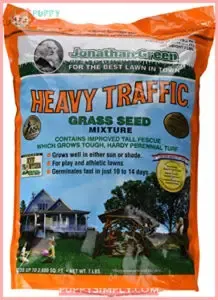
Jonathan Green’s Heavy Traffic grass seed stands out as a premium pet-safe option for households juggling active dogs and lawn care dreams.
This 7-pound mixture combines turf-type tall fescues with perennial ryegrass, creating a resilient surface that bounces back from constant paw traffic.
You’ll appreciate how quickly it establishes – most homeowners see growth within 10 days with proper watering.
The organic, uncoated formula means you won’t worry about synthetic chemicals touching your dog’s paws or being ingested during those inevitable grass-munching sessions.
While it’s manufactured in China and carries a higher price point, the deep root system (up to 4 feet) delivers exceptional durability.
Coverage runs about 2,800 square feet per bag, making it cost-effective for larger yards.
The soft texture feels comfortable under bare feet while maintaining that brilliant green color your neighbors will envy.
Best For: Active households with kids or pets needing a durable, pet-safe grass solution for high-traffic lawns.
- Higher price than standard grass seed options
- Inconsistent results if seed is not fresh or instructions aren’t followed
- Requires diligent watering and soil prep for best growth
- Fast germination and establishes quickly in worn areas
- Deep roots and premium turf blend resist heavy play and foot traffic
- Organic, chemical-free, and safe for pets and children
Creeping Red Fescue Seeds
Creeping red fescue seeds thrive where other pet friendly grass seed varieties struggle – in shaded spots under trees.
This safe grass seed for pets creates a carpet-like lawn that handles moderate foot traffic while requiring minimal upkeep. Proper soil preparation and lawn aeration help these fescue types establish strong roots, though seed germination takes patience at 3-4 weeks.
For dog owners with breeds like the red fox lab, choosing the right grass is vital for their pet’s health and happiness.
Key benefits for pet owners:
- Tolerates shade better than most grass seed safe for pets
- Dense grass density prevents muddy paw prints
- Low-maintenance once established
- Pet safe grass that stays under 14 inches tall
Frequently Asked Questions (FAQs)
How often should I inspect and brush my pets for embedded seeds?
Nearly 40% of dogs experience seed-related injuries during peak growing seasons.
You should inspect and brush your pet after every outdoor adventure, especially during spring and fall when grass seeds are most abundant and likely to embed.
How can I tell if a grass seed has a synthetic coating?
Check the seed label for coating ingredients like polymers, dyes, or fertilizers.
Coated seeds often appear colorful, shiny, or chunky compared to natural seeds.
Uncoated seeds look plain and feel smooth without artificial textures, making them distinct from seeds with coating ingredients.
How do I know which grass varieties are pet-safe?
Your furry friend’s safety depends on choosing uncoated, organic grass varieties.
Look for perennial ryegrass, tall fescue, Kentucky bluegrass, or Bermuda grass without synthetic treatments—they’re naturally pet-friendly and won’t harm curious paws or noses.
What is the best way to water a lawn with a pet?
Water deeply but infrequently to encourage strong root growth. Always rinse areas where your pet urinates immediately to dilute nitrogen concentration and prevent brown spots from forming on your lawn.
How often should I reseed pet areas?
Like patching holes in your favorite jeans, you’ll need to reseed high-traffic pet areas twice yearly—spring and fall work best.
Heavy-use spots might need touch-ups every few months for ideal recovery.
Can grass seed harm cats or other pets?
Most uncoated grass seeds won’t harm cats or pets if ingested in small amounts.
However, coated seeds contain chemicals that could cause stomach upset.
Choose organic, uncoated varieties for maximum safety around curious pets.
Whats the best seeding season for pet owners?
While spring tempts many homeowners, fall’s your golden window for seeding success.
You’ll dodge summer’s scorching heat and give grass time to establish strong roots before your pets start their spring romping season.
How do I prevent pets from eating seeds?
Create barriers using chicken wire or decorative fencing around seeded areas.
Distract pets with toys or treats in other yard sections.
Monitor closely during outdoor time and immediately redirect curious behavior.
Should I use pre-emergent herbicides with pet grass?
You shouldn’t use pre-emergent herbicides when seeding pet grass.
These chemicals prevent all seeds from germinating, including your desired grass seed.
Wait until your new lawn establishes before applying any herbicides.
Conclusion
Ironically, protecting your dog from dangerous lawn chemicals means choosing the most natural grass varieties available.
The best pet safe grass seed options like tall fescue, perennial ryegrass, and Kentucky bluegrass create resilient lawns without toxic treatments.
You’ll get a beautiful yard that handles paw traffic while keeping your furry friend safe from harmful chemicals.
Skip synthetic coatings and fertilizer blends – your dog’s health matters more than a perfectly manicured lawn that could harm them.
- https://patchperfectyard.com/best-grass-seed-for-dogs/
- https://lawnpride.com/pet-friendly-lawn-care/
- https://www.caninejournal.com/best-grass-seed-for-dogs/
- https://doggielawn.com/blogs/blog/comparing-grass-varieties-which-turf-your-dog-loves-most?srsltid=AfmBOop0XHZL8Deqhi5LchT0DMHa_RsFM1ULNc3zSGYSK8iBfoDV5Cfj
- https://www.gfloutdoors.com/pet-friendly-grass-seeds-safe-options-for-dog-owners/

